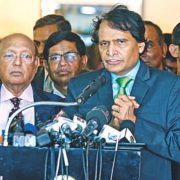Time to be more innovative in fashion, design
Time to be more innovative in fashion, design
Say apparel exporters, buyers
After a journey of four decades of business, the time has come for Bangladesh to be more innovative in fashion and design for sustainability of garment business in the era of fierce competition in global apparel business, exporters and buyers said yesterday.
Also, Bangladesh’s garment manufacturers need to try to change the brand image of the country and the image of the garment sector, as a brighter image of the country and the sector helps get better prices for apparel items, said KM Rezaul Hasanat, chairman and CEO of Viyellatex Group, a leading exporter.
Bangladesh also needs to improve the negotiation and marketing skills so that manufacturers can grab more of the market share while receiving higher prices from retailers and brands, he told a seminar on “Leveraging sustainable supply chain” at the Westin Dhaka hotel as a panel discussant.
British banking giant HSBC and the United Nations Development Programme (UNDP) jointly organised the seminar participated by textile producers, garment exporters, representatives from different retailers, brands and donor agencies and bankers.
Hasanat sought cooperation from development agencies to help Bangladesh brighten its image and that of the garment sector for the sustainability of the apparel business.
Shwapna Bhowmick, country manager of British retail giant Marks & Spencer, suggested garment manufacturers and exporters change the traditional marketing system and shorten lead-time to capture more market share in global apparel business.
Bhowmick, who is a Bangladesh-born country manager for the M&S, also called for improving the capacity of the country’s premier Chattogram port as the volume of garment business is increasing.
Local garment manufacturers also need to increase the production volume of the value-added garment items like suits for which retailers, brands and customers pay more, aiding the sustainability of the garment business, she said.
The government is developing 100 special economic zones across the country to attract more investment from both domestic and overseas investors, Md Abul Kalam Azad, principal coordinator for SDG Affairs at the Prime Minister’s Office, said while addressing the seminar as the chief guest.
Moreover, the government has already allocated 500 acres of land at Mirsarai in Chattogram to garment manufacturers so that they could build factories there and another 500 acres have been set aside from where more allocation can be availed.
Calling for more investment in the potential agro-processed and pharmaceuticals sectors, Azad said the government has been planning to cultivate cotton—the basic raw material of finished garment products—in Africa to meet the growing demand for the white fibre.
Sustainability of the business mainly depends on the welfare of the employees, said Kutubuddin Ahmed, chairman of Envoy Group, another leading garment and textile producer. But at the same time good practices are required to protect the environment, he said.
Ahmed has launched a host of welfare package for his 2,800 employees at Envoy Textile, which has the world’s first Platinum rated LEED (Leadership in Energy and Environment Design) certified green building at Bhaluka.
“At HSBC, our aim is to support the development of sustainable supply chains for our clients, which will help them to grow internationally,” said Francois de Maricourt, CEO of HSBC Bangladesh.
“As the second largest apparel exporter, Bangladesh should continue to drive the sustainable supply chain practices, given the expected impact of climate change.”
“Inclusive business models have the potential to sustainably serve everyone through mutual benefit, be they the smallest enterprises or multinational giants, when tied together in a shared supply chain,” said Sudipto Mukerjee, country director of UNDP Bangladesh.
Impact measurements can help identify supply chain gaps in policy, infrastructure and/or resource and creatively plug them to maximise social benefits and profits for everyone, he said.
Linda Germanis, project manager of UNDP Innovation Hub, gave the keynote presentation.
Rensje Teerink, head of the European Union delegation to Bangladesh; Matthew K Lobner, group general manager, head of international and head of strategy and planning for HSBC Asia Pacific, and Md Mahbub Ur Rahman, deputy CEO and country head for wholesale banking at HSBC Bangladesh, moderated the session.




Leave a Reply
Want to join the discussion?Feel free to contribute!